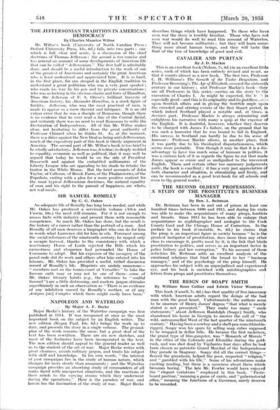THE JEFFERSONIAN TRADITION IN AMERICAN DEMOCRACY
By Charles Maurice Wiltse
Mr. Wiltsc's book (University of North Carolina Press : Oxford University Press, 18s. 6d.) falls into two parts : one which is full, clear and acute, is a discussion of the chief doctrines of Thomas Jefferson ; the second is too concise and too general an account of some developments of Arnericanlife that can be called " Jeffersonian." The first half is admirably done, and should be a useful introduction to the work of one of the greatest of Americans and certainly the great American who is least understood and appreciated here. It is so hard, in the first place, for one steeped in the English tradition to understand a great politician who was a very_ poor speaker ; who made his way by his pen and by private conversations ; who was so lacking in the obvious charm and force of Hamilton. Thus the Jefferson of F. S. Oliver's brilliant,' of American history, his Alexander Hamilton, is a stoek-fignre of futility. Jefferson, who was -the most practical of men, is made to appear as a mere theorist and intriguer. It is an old vulgar error that he was a disciple of Rousseau, though there is no evidence that he ever read a line of the Contrat and certainly there was no need to read Rousseau to write the Declaration of Independence. All of this Mr. Wiltse makes clear, not hesitating to differ from the great authority of Professor Chinard when he thinks fit.- As, at the moment, there is a drive against the New Deal as being anti-Jeffersonian, much of the expository part of this book iii timely -argument,in America. The second part of Mr. NViltse'shpcik is'too brief to be wholly satisfactory. Jefferson was, it is true!go deeply wedded to equality, economic as well as political, that it may well be argued that today he would be on the side., of President Roosevelt and against the embattled mfilionairds of the Liberty League who are appealing to his shade to rebuke the traitor in the White House. But the brieVicemmts of John Taylor, of Calhoun, of Brook Farm, of the Plialausteriesiuf the Populists, ending with a plea for a more positive content for the most typical Jeffersonian doctrines, the:natural .equality of man and his right to the pursuit of hapPiness, are whets, not real meals.


































































 Previous page
Previous page